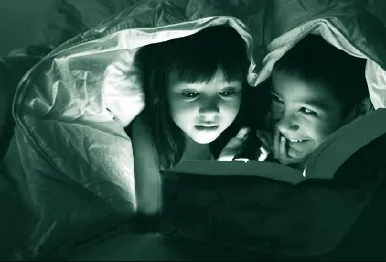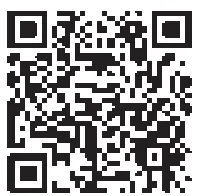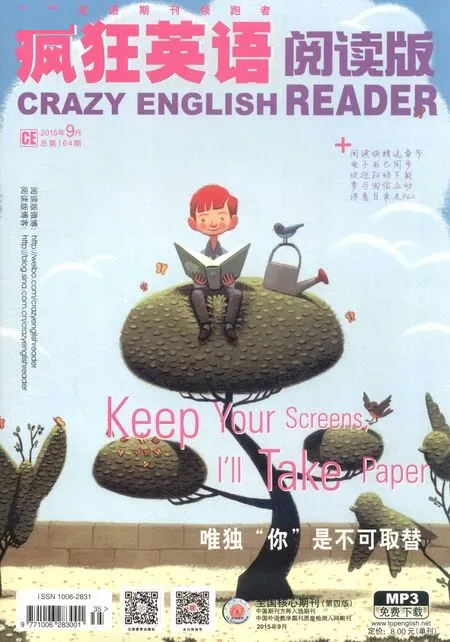唯独"你"是不可取替
by Jesse Hunter Melissa 译
PROLOGUE 卷首语
唯独"你"是不可取替
Keep Your Screens, I’ll Take Paper
by Jesse Hunter Melissa 译

Fill your paper with the breathings of your heart. —William Wordsworth

I am not a Poet Laureate as I long ago aspired, when I was an uncontrollably creative contributor (and eventually co-editor) for my high-school’s literary magazine, but I haven’t forgotten the inspirational and physiological value of putting pen to blank paper and having pages in hand. And the role that paper plays in our reading and writing is the focus of this month’s featured articles.
First, self-titled “literary butterfy” Molly Flatt misses the simple times, when she “had a loving, stable relationship with one paperback at a time.” So she asks her readers,Is Your Reading Suffering from Multimedia Overload?
Next, in Reading Taught Me All about Life, Eva Chase writes about growing up in an age when “TV was rubbish”and how reading, often “under the duvet with a camping torch…infuenced who we were, who we became.”
And in our third and final feature, Tom Chatfield looks into Why Reading and Writing on Paper Can Be Better for Your Brain, and comes to the conclusion that “the varied, demanding, motor-skill-activating physicality of objects tends to light up our brains brighter than the placeless, weightless scrolling of words on screens.” Though he concedes screens are also “something free to engage and activate our wondering minds in ways undreamt of a century ago.”
So if one thing can be extrapolated from the opinions of writers and readers near and far it is this: The digital age is a marvelous thing but don’t lost touch with the past, or else we may lose part of ourselves in the present and possible paths for our children in the future.
我不是桂冠诗人,虽然很久以前我曾这样期盼过。那时的我思如泉涌,会给我高中的文学杂志投去一些原创稿子,后来还成为了那本杂志的合编者,但现在我也没忘记提笔在空白纸张上书写、手上拿着稿子时那种对心理和生理的激励作用。这个月的主题文章就是关于纸质阅读和写作的。
在第一篇文章中,自称为“文学蝴蝶”的莫莉·弗拉特怀念从前简单的时光,那时她“每次只与一本书建立一段有爱而稳定的关系”。因此,她感叹《多媒体阅读——不能承受之重》。
在第二篇文章《阅读教给我的人生》中,伊娃·蔡斯写了成长于“电视节目一文不值”的年代,常常“在被子下打着手电筒”看书是如何“影响、造就了我们。”
在第三篇也是最后一篇主题文章中,汤姆·查特菲尔德深入讨论了《为何传统纸质阅读和写作更有益于大脑?》,最后得出的结论是“多样化的、耗费心神的、需要运动技能激活的实物,相对于无物理空间特征、没有重量的屏幕文字,更有利于激活我们的大脑”。尽管他也承认电子屏幕“可以自由地获取信息,它以一个世纪前人们意想不到的方式刺激我们充满好奇的大脑”。
因此,从古今一些作家和读者的意见中我们可以得到这样的推论:数字时代固然很好,但我们不能因此切断与过去的联系,否则我们可能会迷失自我,而将来我们孩子的生活也会少了一些可能性。

epub扫一扫即可下载9月号精选有声阅读体验版至你的手机手机体验版电子书格式为多媒体技术,建议苹果及安卓用户先下载安装"奇特阅读器"app(百度一下),然后再扫码下载有声阅读体验版。(特别说明:手机安装支持epub2.0版本的阅读器即可阅读体验版文件)

epub扫一扫即可下载9月号精选阅读体验版至你的手机手机体验版电子书格式为多媒体技术,建议苹果及安卓用户先下载安装"奇特阅读器"app(百度一下),然后再扫码下载阅读体验版。(特别说明:手机安装支持epub2.0版本的阅读器即可阅读体验版文件)

